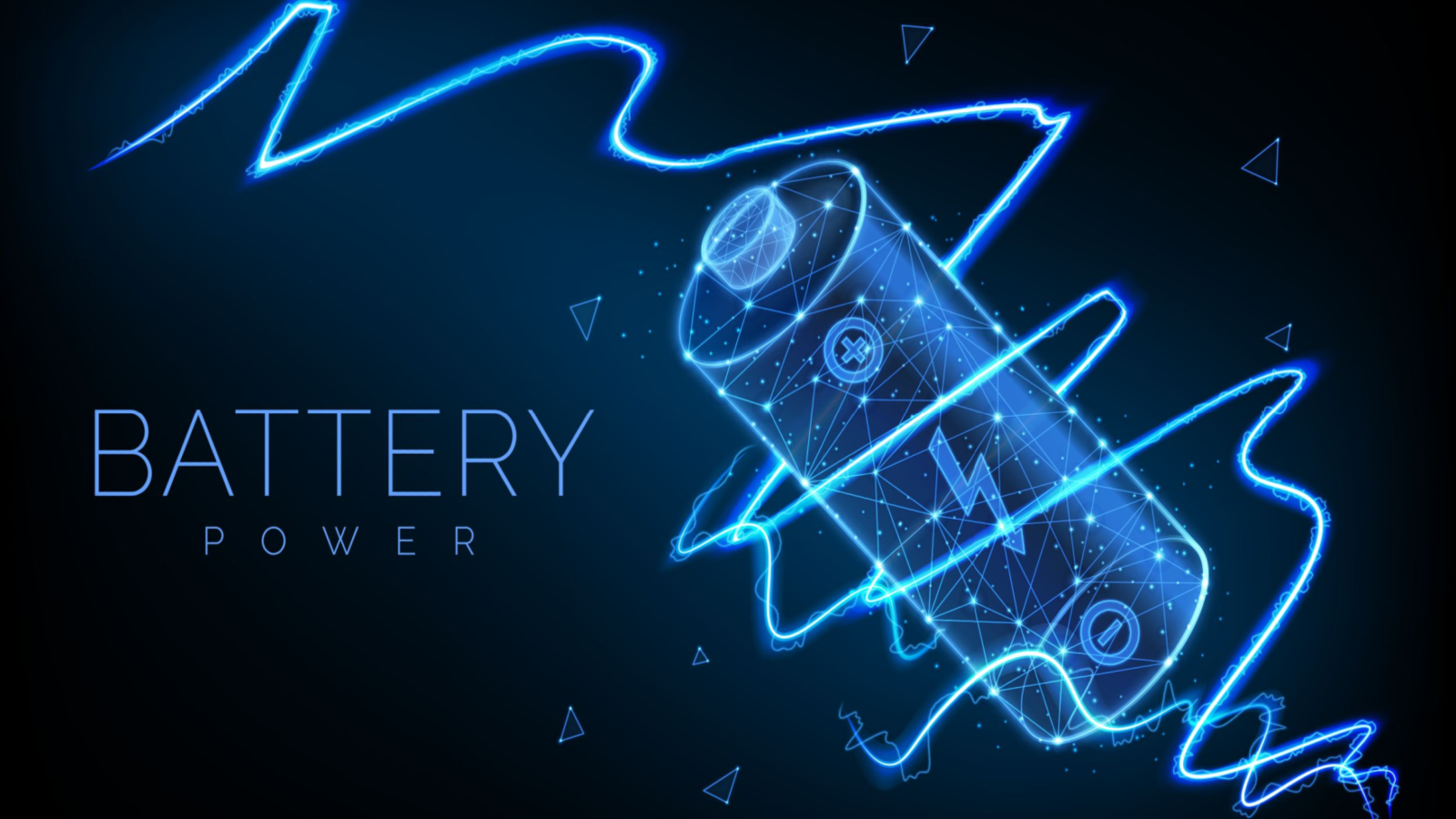The attractiveness of battery stocks cannot be overstated in today’s quickly shifting industry. This sector, which is the backbone of the electrification revolution, is transforming sectors ranging from automotive to energy storage. Those that invest in battery technology are not merely betting on a trend; they are aligning with a future in which clean energy and efficiency are vital.
Navigating this volatile terrain, the chosen battery stocks distinguish themselves not just for their strong performance but also for their unique initiatives in a competitive market. They exemplify dependability and a pioneering attitude, both of which are vital characteristics for firms seeking to flourish in the field of battery technology. Remember, when we go further into these equities, the aim isn’t simply financial gain; it’s about becoming a part of a sustainable future, one investment at a time.
Albemarle (ALB)

Albemarle (NYSE:ALB), a significant leader in the battery stocks market, has exhibited outstanding growth with a 76% return over the last five years. This success underscores its strong position in the lithium sector, which is critical for electric cars and renewable energy storage.
Furthermore, Albemarle’s recent 10% increase in net sales in the third quarter of 2023 indicates consistent growth, but a drop in net income and profits per share. The company’s strategic expansion in Baton Rouge, with a $53 million investment, demonstrates its commitment to improving manufacturing capacity.
Albemarle is a shining example for everyone considering investing in the lithium business. Its ambitious development strategy is in line with the sharp increase in demand for lithium-ion batteries. However, in light of the recent earnings hiccup, investors should take into account their risk tolerance and long-term objectives before buying in.
Solid Power (SLDP)
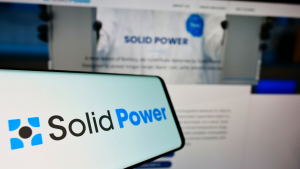
Despite a difficult year, Solid Power (NASDAQ:SLDP), a significant participant in the battery stocks industry, has demonstrated resiliency.
Its stock has dropped by almost 30% in the last year. However, latest quarterly statistics show that sales has increased by an astonishing 126% to $6.4 million. This increase is significant in the context of the rapidly growing battery technology market.
The company’s operating expenses increased by 39% to $20.7 million, reflecting its investment in technology and growth. Moreover, in terms of assets, Solid Power has a solid foundation. Its cash and short-term investments stood at $193.5 million, despite a 48% decrease. Total assets were reported at $543.9 million, with a slight decrease of 9%. Notably, its total liabilities decreased significantly by 41%, to $26.3 million. This robust financial structure underpins its ability to sustain and expand operations.
Solid Power’s important position in the solid-state battery technology field is emphasized by its cooperation with SK Innovation and endorsements from major car brands like as Ford Motor (NYSE:F) and BMW. The company’s participation in these kinds of programs shows that it is forward-thinking. Additionally, the U.S. Department of Energy’s award for developing sustainable battery technologies further enhances its credibility. Solid Power’s commitment to innovation and scaling up production is setting the stage for its significant role in the electric vehicle revolution.
Panasonic (PCRFY)
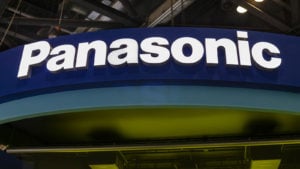
In the battery industry, Panasonic (OTCMKTS:PCRFY) is leading the way, especially with regard to electric vehicle technology. Its intention to begin mass producing a new lithium-ion battery for Tesla (NASDAQ:TSLA) is a noteworthy milestone. The “4680 format” battery is a significant size increase over existing versions. It claims to increase vehicle range and reduce production costs. A larger range of consumers may find EVs more enticing as a result of this innovation.
Panasonic has taken a bold step by increasing the manufacture of EV battery cells in North America. By 2031, it wants to increase its yearly output capacity to 200 gigawatt-hours. This would represent a significant increase over what it now produces. The business intends to open at least two additional facilities specifically for the manufacture of 4680 battery cells. Sites like Nevada and Kansas are being considered; these correspond with the expanding electric vehicle industry in North America.
The 4680 lithium-ion battery represents a major advancement in energy capacity. In comparison to current batteries, it is anticipated to double in size and quintuple in energy capacity. This development may result in fewer batteries being required for each vehicle, which would cut EV prices. Panasonic is leading the way in EV innovation with an EV range improvement of more than 15%. In addition to helping Tesla, this step may draw in other manufacturers and highlight Panasonic’s power in the market.
Honeywell International (HON)

Underscoring its dedication to cutting-edge technologies in automation and digitalization, Honeywell International (NASDAQ:HON) has broadened its product line by purchasing Carrier Global’s (NYSE:CARR) Global Access Solutions for $4.95 billion. Honeywell’s strategic ambitions are aligned with the purchase, which strengthens its position in building automation.
In the burgeoning battery stock market, Honeywell’s position is strengthened by recent advancements in solid-state battery cells. These cells, developed by QuantumScape (NYSE:QS), promise safer and faster-charging capabilities for electric vehicles, offering longer ranges. Honeywell’s interest in these technological developments suggests potential future collaborations.
Research in solid-state sodium batteries, like the University of Maryland’s innovative 3D electrolyte architecture, indicates significant progress in battery technology. This advancement aligns with Honeywell’s focus on efficient and sustainable energy storage solutions.
Honeywell International’s latest acquisition and its alignment with cutting-edge battery technologies represent a strategic shift towards innovation in automation and energy solutions. As the battery technology sector evolves rapidly, Honeywell is poised to integrate these new advancements into its broad portfolio, reinforcing its status as a leader in technology and sustainable solutions.
NextEra Energy (NEE)
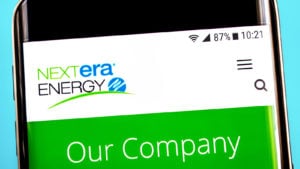
NextEra Energy (NYSE:NEE), a prominent American energy company, is making notable strides in battery stocks. As a leader in the renewable energy sector, it focuses on wind and solar power generation. Its significant investment in energy storage solutions is pivotal. Energy storage, essential for balancing supply and demand, is critical for the company’s success. This ensures a consistent electricity supply, crucial in renewable energy systems.
In the realm of stock performance, NextEra Energy recently exhibited resilience. Its stock price closed at $61.57, a notable 1% rise from the previous session. This outperformed the S&P 500’s decline, reflecting the company’s stable market position. In revenue projections, it’s expecting a slight 0.1% increase from the previous year. This indicates a stable financial outlook, crucial for investor confidence.
Recent strategic moves have reshaped NextEra Energy’s business landscape. The acquisition by Kinder Morgan (NYSE:KMI), priced at $1.82 billion, is a landmark deal. It involves a vast network of natural gas pipelines, pivotal for NextEra’s shift towards renewable energy. Additionally, the sale of its Texas natural gas pipeline portfolio aligns with its renewable focus. These decisions reflect a deliberate strategy to strengthen its position in the energy market.
The selection of NextEra Energy Transmission MidAtlantic’s proposal by PJM signifies its growing influence. This highlights its commitment to expanding its transmission capabilities. Such initiatives are essential for the company’s ongoing success in the energy sector. NextEra’s active portfolio management demonstrates its adaptability and foresight in an evolving energy landscape.
BYD Company (BYDDF)
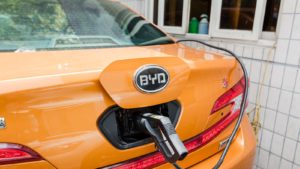
BYD Company (OTCMKTS:BYDDF), a burgeoning force in the electric vehicle (EV) sector, is challenging industry giants. In 2023, it sold an impressive 1.6 million pure EVs out of 3 million new energy vehicles. This milestone marks BYD’s evolution into a noteworthy competitor in the EV landscape. The firm’s success is rooted in its cost-efficient production and self-reliant battery manufacturing capabilities. These strengths have catapulted BYD into a promising position within the battery stocks category.
Internationally, BYD is broadening its horizon, particularly in Europe and Latin America. It plans to set up a production hub in Hungary, underscoring its dedication to the European market. In Brazil, BYD is electrifying public transport, backed by the state development bank BNDES. These moves demonstrate BYD’s strategic global expansion, enhancing its profile as a versatile and forward-thinking company.
Additionally, BYD is diversifying its portfolio with new luxury sub-brands like Yangwang and Fang Cheng Bao. These brands, while premium, offer value with post-sales perks and rebates. This approach is distinct from other Chinese EV makers, enabling BYD to capture a wider market share in China. Such strategic diversity fortifies BYD’s standing, not just as a mass-market player but also as a luxury EV provider.
Amplify Lithium & Battery Technology ETF (BATT)

In the constantly developing lithium-ion battery business, Amplify Lithium & Battery Technology ETF (NYSEARCA:BATT) emerges as a promising prospect. BATT, which trades on the NYSE Arca, capitalizes on this trend by concentrating its efforts on important sections of the lithium battery business.
This ETF’s strategy is intricately linked to the EQM Lithium & Battery Technology Index. It aims to replicate the index’s performance, offering investors a diverse exposure. BATT includes companies specializing in battery storage, battery metals and materials and electric vehicles. This targeted approach positions it well in a market poised for significant growth. Furthermore, the ETF has an average trading volume of about 59,680 and net assets of roughly $113.7 million. With an expense ratio of 0.59% and a /PE ratio of 10.4, BATT provides a 4.7% return.
In summary, BATT’s distinct position in the lithium-ion battery market makes it an intriguing choice for companies wishing to enter this expanding market.
On the date of publication, Muslim Farooque did not have (either directly or indirectly) any positions in the securities mentioned in this article. The opinions expressed in this article are those of the writer, subject to the InvestorPlace.com Publishing Guidelines
